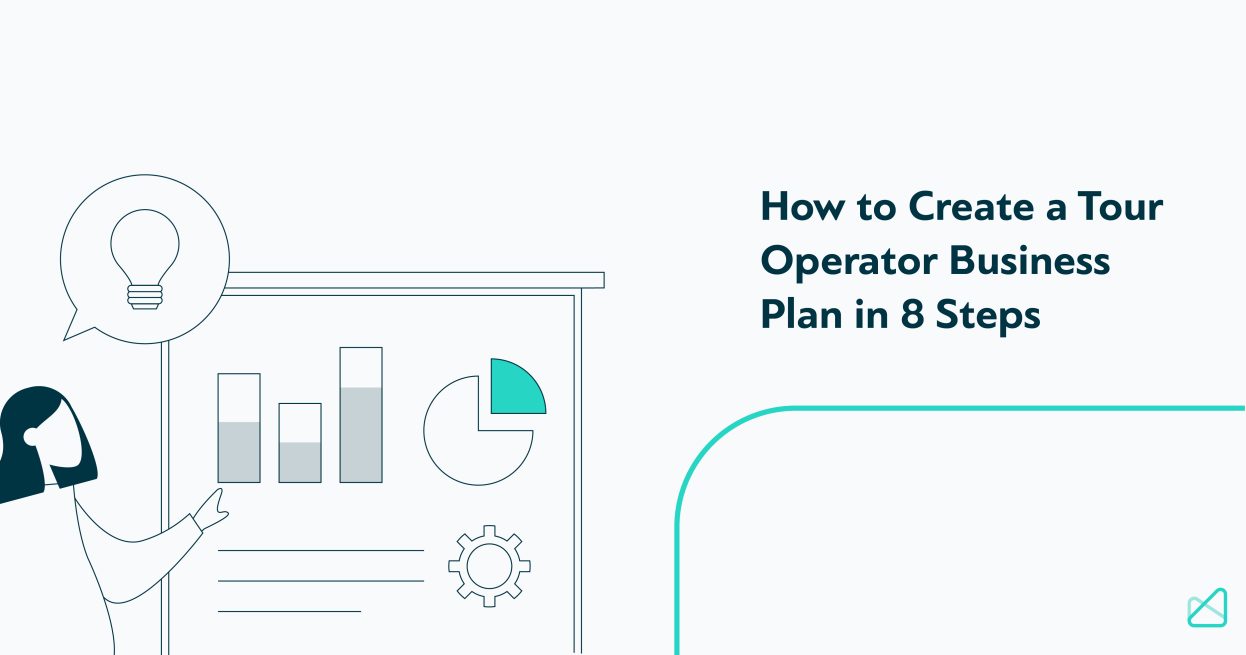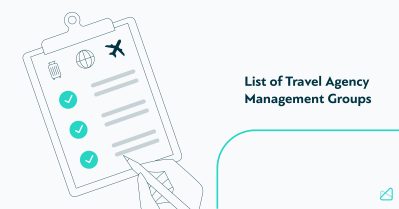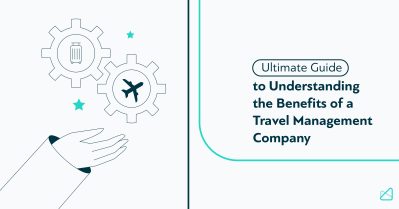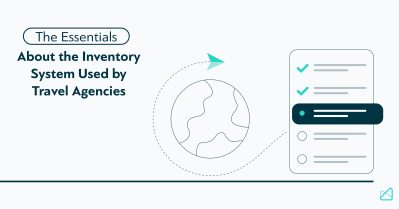How to create a tour operator business plan in 8 steps

Wondering how to turn your tour operator idea into a real business? The first step to launching a startup and getting investors onboard is to develop a formal proposal called a business plan. Whether you want to start a travel agency, a walking tour company, or an adventure travel business, you will use a business plan to communicate exactly how you plan to make your idea come to life.
Creating a tourism business plan might sound daunting; in this article, we’ll show you how to do one and offer lots of advice for first-time founders. You’ll be able to use this article as a tour operator business plan template to write your own sample business plan (as an exercise) or to create the real thing.
To more clearly illustrate how to create a tour operator business plan, we’ll use a sample business as we go through each section. Our sample business is a small tour operator startup that specializes in ecotourism in Thailand.
Preparing to Write a Business Plan
Before you start to create your official business plan, it can be helpful to think through several aspects of your business so that you are fully prepared to address each topic in the business plan template. One excellent preparation exercise is to complete a Business Model Canvas for your company.
The Business Model Canvas encourages you to think critically about your customers, cost structure, revenue streams, marketing strategy, and more. It’s the perfect warm-up for your business plan because you’ll incorporate your Business Model Canvas notes into the actual business plan document. We recommend that you do this exercise with your co-founders, if you have any, and with a whiteboard – you’ll probably make lots of changes as you go!
You can find a printable Business Model Canvas template here.
Tour Operator Business Plan Template
Your tour operator business plan should contain at least seven sections: an executive summary, a company overview, a description of your services, an analysis of your market, an implementation plan, a team summary, and a financial plan. You might have one or more appendices at the end, if you have additional relevant information to include. The finished product should be formatted nicely and incorporate your company’s logo and branding.
Executive Summary
As the first component of your business plan, the executive summary is arguably the most important section. If you’re pitching your idea to investors, they’re likely very busy people, so you want to grab their attention from the beginning. The executive summary should contain a concise outline of your tour operator company’s objectives and goals, your mission and/or vision statements, your key success factors, and a clear description of your value proposition.
Company Overview
Think of this section as what you would post on the “About” section of your tour operator company’s website. The company overview should explain who your company’s key leaders are, how and when the business started, what the ownership structure looks like (if you have investors, for example), where your office is located, and an outline of your current assets and debts. If you’re in the early stages of your business, this section might be quite short.
Operations Plan
The operations plan is where you describe exactly what your company will offer. What kinds of tours will you sell? Where exactly will you operate? This is the type of information you would list on your website for potential customers or guests to read – but without too much of a sales pitch.
In this section, it can also be helpful to include a description of the full “life cycle” of your business. What happens before, during, and after a tour? What steps does the guest complete, and what happens behind the scenes at your company’s office?
Thinking about our Thai ecotourism company, we might illustrate how someone could book a tour perhaps six months in advance on our website. Between booking and arrival, we coordinate accommodation, meals, and transportation with partner providers. When the tour concludes, we offer transportation back to the airport and follow up with a special offer to book another tour with us at a discount.
Market Analysis
This section explores your specific niche within the tourism industry and the geographic location(s) where you plan to operate. Who are your target clients or guests? Who are your main competitors? What trends exist in this facet of the industry? Is the amount of visitors to your location increasing or decreasing?
Try to include statistics from reputable sources whenever you can. Destination marketing organizations, tourism bureaus, and air traffic data, just to name a few, can provide valuable insight and add credibility. This section should leave no stone unturned so that your reader can truly understand your market conditions.
In our ecotourism business in Thailand, for example, we would include information about travel trends in Thailand (like the most popular feeder markets), new air routes, economic trends, the number of new hotels being built, etc. We would also explore the ecotourism market; are more people choosing eco-friendly travel options today compared to five years ago? What companies are the current ecotourism market leaders globally and in Thailand?
Implementation
Now that you’ve explained your business idea and described the market in which you plan to operate, it’s time to outline exactly how you will bring your tour operator business to life. This section should include a SWOT analysis, details about your marketing and pricing strategies, and a sales projection.
In the SWOT analysis, you will explore your company’s strengths, weaknesses, opportunities, and threats. What does your company offer that nobody else in the market does? What are some potential challenges that you will need to face? Using our ecotourism company example, a threat could be natural disasters – if there are floods or mudslides, our business cannot operate. On the other hand, an opportunity is that more people are interested in eco-friendly travel options.
Your marketing and pricing strategies should be very specific. How will customers find your company? Which online channels will you use? Will you work through travel agents or directly with your customers?
Your pricing strategy should include the exact rates you plan to charge for at least a year in advance. For example, our ecotourism company in Thailand might charge $699 for a package during low season, $899 during high season, and $999 over holiday periods, with rates increasing 5% each year.
We might also offer a 10% discount for advance purchase bookings made at least 6 months in advance and charge a 50% cancellation fee for any reservations cancelled within 3 months of the tour departure date. Based on your pricing strategy, you can create a sales projection that will estimate your company’s sales performance, preferably over the next three years.
Team Summary
After your reader understands what your tour operator business will do, they’ll wonder who is going to make it happen. And if you’re planning to launch a full-fledged tour operator business, you’re probably not going at it alone. The Team Summary section should include a thorough plan for your company’s organizational structure, key leaders, employees, and training processes.
Do you already have a management team in place, or will you need to hire additional leaders? How many employees will you need, and how much will you pay them? And how will you train and develop your employees? The Team Summary should answer all of these questions and provide enough information for potential investors to understand exactly how you plan to staff your business, pay your employees, and ensure all team members are trained properly.
Financial Plan
The financial plan is extremely important to potential investors because they will want to maximize the return on their investment. Your financial plan is essentially a projection of your revenue streams and cost structure for your company’s first five or so years of operation. It will include not only revenue from ticket sales and costs from employee salaries, but also details like tour-operator software costs, insurance, taxes, marketing spend, depreciation of assets, interest on loans, and more.
If you don’t have a finance background yourself, it may be helpful to seek assistance from an accountant or someone who knows the ins and outs of financial modeling.
Additional Information
In an appendix, you can include supporting information or statistics that may be helpful for potential investors, but not essential to your business plan. For instance, you could include a full report on air traffic trends that you used in your Market Analysis section.
Tips and Tricks for A Strong Tour Operator Business Plan
Writing a business plan is certainly not an easy task. It’s time consuming and requires a lot of thought, but a well written business plan can lead to significant growth for your company. As you complete your business plan, keep these pieces of advice in mind:
- Conduct thorough research on your market. When you pitch your company to investors, you want to be seen as an expert, so learn as much as you can about your competitors and market trends.
- Simplify your words and descriptions whenever possible. A business plan is not the place to wow your reader with flowery language – instead, you want your reader to easily grasp your value proposition. Think about writing so that a fifth-grader can understand it. The last thing you want is for your reader to be confused about what your company actually does.
- Don’t be afraid to make changes. As you work on your business plan, you might discover that some aspects of your business need to be adjusted for the greater good of the company. After all, the companies that are the most adaptable are the ones that survive!
- Get a second opinion (or a third or a fourth). A good test of your business plan’s readability and clarity is to let someone outside your industry read it, like a family member or friend. If they have a lot of questions, you might need to adjust your descriptions or more clearly explain your plans.
- Proofread! Your business plan is a reflection of your company’s values. If your formatting is sloppy and your text is full of typos, your reader might question whether you have the attention to detail necessary to run a successful business.
Now that you have all the tools to create a great tour operator business plan, it’s time to get to work!
Subscribe to
our newsletter
Yay! You are now
subscribed to our
newsletter
Mize is the leading hotel booking optimization solution in the world. With over 170 partners using our fintech products, Mize creates new extra profit for the hotel booking industry using its fully automated proprietary technology and has generated hundreds of millions of dollars in revenue across its suite of products for its partners. Mize was founded in 2016 with its headquarters in Tel Aviv and offices worldwide.
Related Posts

List of 32 travel agency management groups
6 min. Whether you are thinking of moving into the travel industry or you already own a business in this sector, the concept of travel agency management groups is a task worthy of analysis and study. Defining an effective business model for your retail travel agency is one of the key factors in optimizing sales […]

Ultimate Guide to Understanding the Benefits of a Travel Management Company
12 min. Managing and operating modern businesses often encompasses corporate travel. However, managing business travel is complex, especially with limited experience and resources. You must ensure that everything goes smoothly for the travelers while staying on top of the logistics and expenses. That’s why many organizations decide to outsource their travel management to a dependable […]

The Essentials About the Inventory System Used by Travel Agencies
11 min. While travel agencies have to overcome many challenges to remain competitive, there is one challenge in particular that all agencies need to overcome despite their size or target market. They need to excel as intermediaries between tour operators or travel product suppliers and consumers or travelers. The real question is, how do they […]